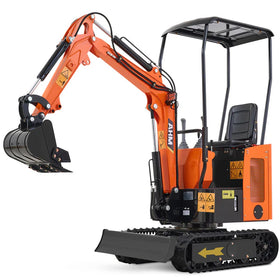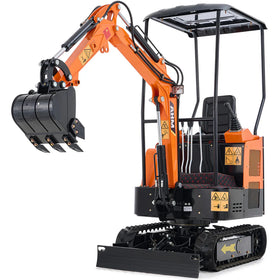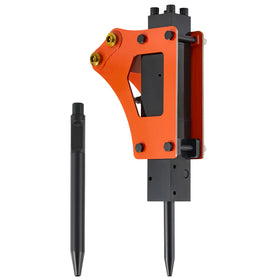Excavator attachments are crucial for success in this business, especially in the case of a mini excavator.
Choosing the right excavator ripper can make the difference between you blasting through frozen ground in minutes or spending hours fighting compacted soil with the wrong tool.
Here's what to keep in mind: the difference between going for a $190 ripper and a $3,500 heavy-duty one ultimately comes down to matching the tool’s specifications to what your work actually requires.
With the mini excavator ripper attachment market now offering dozens of options, most contractors need to understand a few key factors to make the right choice. Machine compatibility, material specifications, and what you’re looking to do should drive the purchase decisions, not brand names or fancy features.

Excavator Ripper Attachment Types Explained
There are three main ripper excavator attachment designs: single-shank rippers, multi-shank rippers, and trenching rippers. Each of these ripper attachment types is designed for specific applications and is equipped to handle different types of materials:
1. Single-Shank Rippers
Single-shank rippers have one robust penetrating point that concentrates the excavator's full power into a small area. This design delivers maximum penetration force for the toughest applications and is the most common ripper configuration you’ll find.
Key characteristics of Single-Shank Ripper Attachments
- Concentrated force at a single penetration point
- Best for frozen ground and compacted materials
- The simple design reduces maintenance requirements
- Weighs 26-235 pounds, depending on excavator size
- Ideal for 1-6 ton mini excavators
Common applications for Single-Shank Rippers
- Breaking frozen ground in winter conditions
- Penetrating hard-packed clay and rocky soil
- Demolishing concrete and asphalt
- Ripping through tree roots and stumps
- Extracting old utilities and buried materials
2. Multi-Shank Ripper Attachments
Multi-shank designs feature two or three penetrating points that work simultaneously across a wider area. These rippers move more material per pass at the sacrifice of less concentrated force compared to single-shank versions.
Key characteristics of Multi-Shank Ripper Attachments
- Covers a wider working area per pass
- Better for softer materials requiring less penetration
- Higher productivity
- Typically found on larger excavators of over 6 tons
- Maintenance is more complex

Common Uses for Multi-Ripper Attachments
- Breaking up large areas of moderately hard soil
- Agricultural land preparation
- Ripping shallow depths
- Road base preparation work
3. Trenching Ripper Attachments
Trenching rippers feature a flat bottom profile, which is wider than standard rippers. This design is specialised for creating consistent trenches for utilities and drainage systems.
Key characteristics of Trenching Rippers
- Flat bottom creates uniform trench profiles
- Wider than standard rippers for trench dimensions
- Consistent depth control across length
- Specialised application focus
Common applications for Trenching Ripper Attachments
- Utility line trenching
- Drainage system installation
- Underground cable preparation
- Trenching for irrigation systems
 How to Choose Excavator Ripper Attachments for a Mini Excavator
How to Choose Excavator Ripper Attachments for a Mini Excavator
When selecting the right ripper attachment for mini excavator machines, it’s important to match certain critical specifications to your equipment and applications.
There are four main factors to get right: it must be compatible with your mini excavator, it must be a good quality ripper attachment, it must meet the requirements for your desired project, and it must be straightforward to fit and install.
Getting these factors right will prevent compatibility issues and ensure optimal performance.
1. Ensure it is Compatible with Your Mini Excavator
The excavator ripper tooth must physically fit your machine's arm mounting points. These measurements determine whether an attachment will work with your excavator, regardless of other features.
Dimensions to verify:
- Pin diameter: Must match excavator arm pins exactly (typically 0.98-1 inch for mini excavators)
- Pin center distance: Spacing between mounting pins
- Arm width compatibility: Ripper ears must fit outside the stick without interference
- Quick coupler compatibility: Verify the mounting system matches if you’re using a quick-attach system
Machine weight classes:
- 1-2 ton machines: Lighter rippers (15-30 pounds)
- 2-4 ton machines: Medium rippers (30-70 pounds)
- 4-6 ton machines: Heavy-duty rippers (70-150 pounds)
2. Check the Material Quality
The material from which your mini excavator ripper attachment is made directly affects its durability and service life. Cheap materials will obviously fail quickly in demanding applications, leading to downtime and replacement costs.
Material specifications:
- AR400 steel: Abrasion-resistant, industry standard for ripper shanks
- T1 steel: High-strength alternative offering excellent durability
- Manganese steel: Superior hardness for extreme wear resistance
3. Ensure it Meets Your Application Requirements
The type of work you do determines which ripper excavator attachment to get for the best performance.
Material considerations:
- Frozen ground: Requires maximum penetration force (single-shank design)
- Rocky soil: Needs a wear-resistant tooth and a reinforced shank
- Compacted clay: Requires concentrated force
- Root removal: Demands a strong shank without excessive weight
- Demolition work: Requires heavy-duty construction throughout
Depth requirements:
- Shallow ripping: Shorter shanks (12-24 inches) provide better control
- Deep penetration: Longer shanks (30-42 inches) reach the target depth more easily
4. Budget Considerations
New excavator ripper attachments for compact equipment typically range from $1,500 to $3,500, depending on size, materials, and brand reputation.
Price range breakdown:
- Budget options ($150-500): Mini excavator rippers for light-duty work
- Mid-range ($500-1,500): Quality construction for regular use
- Professional grade ($1,500-3,500): Heavy-duty materials and reinforced design
5. Fitment and Installation
Proper fitment ensures safety and performance once the mini excavator ripper attachment arrives on site. A poor fit creates dangerous working conditions and accelerates wear on both the attachment and the machine.
Things to consider during installation:
- Minimal side-to-side movement when installed
- No shaking or rattling during operation
- Pins should slide through the mounting points smoothly
 Affordable Excavator Ripper Attachment from AHM
Affordable Excavator Ripper Attachment from AHM
The AHM Ripper Mini Excavator Attachment Tool delivers professional excavator ripper tooth performance at a fraction of the cost. Built from high-hardness manganese steel with a pointed penetrating end, this ripper tackles frozen ground, compacted soil, and rocky terrain while fitting mini excavators up to 2 tons.
Performance specifications:
- 17.7 x 7 x 7.5 inch overall dimensions provide a compact working profile
- A 26.2-pound weight doesn't overload smaller mini excavators
- Manganese steel construction ensures exceptional wear resistance
- Single-shank design concentrates the full machine power at the penetration point
Compatibility:
- 3.66-inch span fits standard mini excavator arms
- 0.98-inch arm pin housing matches common pin diameters
- 3.3-inch center wheelbase works with AHM and other brands
The Bottom Line
Now you know that choosing the right excavator ripper attachment comes down to matching machine specifications, material construction, and application requirements to your actual work.
Most people operating 1-2 ton mini excavators will get the maximum value from single-shank rippers built with manganese or AR400 steel that costs $150-500, rather than overspending on heavy-duty models designed for larger machines.
The AHM ripper at $189.99 delivers all the essential specifications most operators need - proper fit for up to 2-ton excavators, manganese steel construction for durability, and concentrated penetration force for frozen ground and compacted materials.
Match your ripper to your mini excavator weight class and the type of material you’re working on, verify the mounting dimensions fit your excavator, and you'll have the right tool for efficient ripping work.








